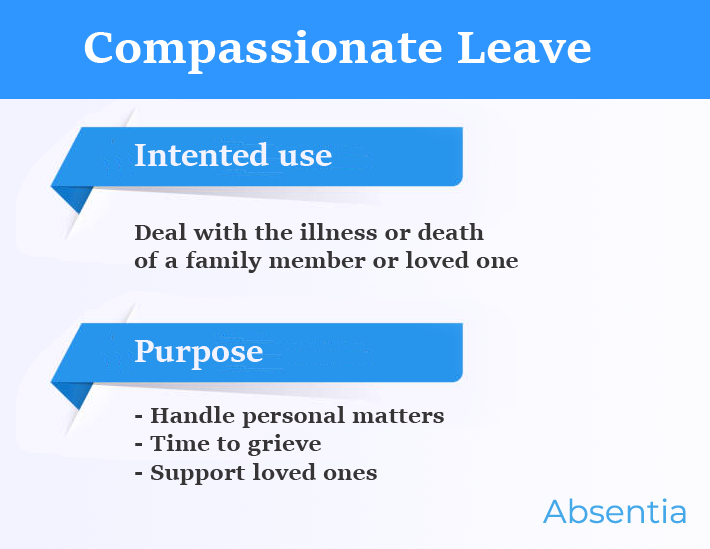
What is Compassionate Leave at work?
Compassionate leave, also known as bereavement leave or family medical leave, is time off from work that employees can take in order to deal with a difficult or emergency situation, such as the illness or death of a family member.
The purpose of compassionate leave is to provide employees with time to handle their personal matters and take care of their own well-being during a difficult time. This type of leave allows employees to take the time they need to grieve, support their loved ones, or handle other personal matters without worrying about their job security or the impact on their work.
The specifics of compassionate leave vary depending on the employer and the applicable laws. In some cases, employees may be entitled to a certain amount of paid leave, while in other cases the leave may be unpaid. The length of time that employees are entitled to take compassionate leave also varies, with some employers offering a few days of leave and others offering several weeks.
In addition to the length of the leave and the pay provided, the circumstances under which compassionate leave can be taken also vary. In some cases, the leave may only be available in the event of the death of a close family member, while in other cases it may also be available for other emergency situations, such as a serious illness or injury.
It is important for employers to have a compassionate leave policy in place, and to make sure that their employees are aware of the details of the policy. This can help to ensure that employees are able to take the time they need to handle difficult situations, while also ensuring that the business is able to continue operating smoothly.
Benefits of offering compassionate leave
- Allows employees to take time to grieve and deal with the emotional impact of a loss, improving their mental health and well-being
- Improves employee morale and loyalty, leading to increased motivation and productivity
- Can foster a positive company culture and reputation, which can be important in attracting and retaining top talent
- Helps to create a more positive and supportive work environment, benefiting both employees and employers.
Common compassionate leave policies
A common compassionate leave policy is one that allows employees to take time off from work after the death of a loved one. The amount of time off that is granted under this type of policy can vary, but it is typically a few days to a week. Some companies may also offer additional paid time off for employees to attend funerals or make arrangements related to the death of a loved one.
In addition to offering time off, many companies also provide support and resources for employees who are dealing with the loss of a loved one. This can include access to counseling services, bereavement leave support groups, or other forms of assistance.
Overall, the specifics of a compassionate leave policy will vary depending on the company and its policies. However, a common approach is to offer a limited amount of time off and additional support and resources for employees who are dealing with the death of a loved one.
Summary
Overall, compassionate leave is an important benefit that can help employees to cope with difficult situations and take care of their own well-being. By providing employees with the time and support they need, employers can show their commitment to the well-being of their employees and help to create a positive and supportive work environment.